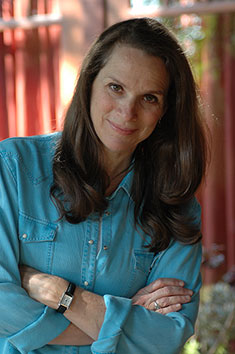Levitt misses this exchange because she’s back in her office, a brick-walled room lined with framed posters from some of the films she has cast: The Joy Luck Club, Heaven and Earth, and The Million Dollar Hotel. When Hickenlooper pads in, Levitt peers at him through wire-rimmed glasses. “Did you just cast her because you loved her from The Brady Bunch?” she asks.
“Of course,” he says, scratching his goatee. As the film’s director, he is the final arbiter of all casting decisions.
Levitt rolls her eyes. “You still have her lipstick mark on your cheek,” she teases, her nasal voice sounding mother-hennish if not annoyed. She had other actresses in mind for that part.
Two months later, during the filming of The Man from Elysian Fields, the director will ask Levitt to replace his teenage crush with another actress.
The reason? “Too pretty.”
In the capricious world of moviemaking, casting remains one of the most important but least understood jobs. Typically, casting directors offer a range of services, from drawing up lists of prospects to screening candidates on videotape to conducting nationwide searches and overseeing auditions. Demands vary from negotiating a bit player’s fee to populating a director’s vision with the right faces and voices. Casting is the only trade not recognized with an Academy Award; the Casting Society of America honors outstanding achievement with its annual Artios awards, the profession’s equivalent of the Oscars.
There are some 750 film and TV casting directors nationwide—a threefold increase since 1980—and about 500 of them are based in Los Angeles. Many agencies, like Levitt’s, are sandwiched between Hollywood and Beverly Hills: Popular locations include the Asahi Beer building at Wilshire and La Brea; the studio complex at Formosa and Santa Monica, known simply as “the Lot”; and the former pied-a-terre of Liberace on Beverly and Gardner. The offices tend to be nondescript and could easily be mistaken, at first glance, for accounting firms or podiatry clinics. The world of casting, in other words, is at once ubiquitous and invisible—and fiercely competitive. It is also the only realm in Hollywood that women have traditionally dominated.
After spending several years working for the major studios, Heidi Levitt opened her first independent casting office in Hollywood in 1994, the year she shared an Artios with Risa Bramon Garcia for their work on The Joy Luck Club. Last year, she moved her business, Three Chapeau Productions, to a second-floor suite on Melrose. Her office, where she works with a partner and an associate, has the hip feel of a set from Friends—Monterey chair, nursery curtains, glass-block wall.
Like most of her colleagues, Levitt shifts between mainstream studio fare and indie art-house projects. She has a reputation for securing smart ensemble casts for low-budget hits like Nurse Betty and for her blunt, plainspoken treatment of directors and producers. Actors value the respect she grants them and admire her choice of material. No one makes a killing as a casting director: Fees range from $15,000 to $75,000 for jobs that last as long as three months. “It’s nothing to write home about,” says Levitt.
The task never gets easier. During the past decade, casting has changed as radically as the Industry itself, and for some of the same reasons. With soaring budgets, the financial risks are greater than ever. Often, filmmakers try to minimize those risks by selecting a well-known actor to encourage box-office success. More and more, as the costs of filmmaking are shared among studios, foreign lending agents, and distribution companies, the overseas appeal of stars has become a key ingredient in casting decisions. In the case of many independent films, U.S. backers choose screen talent strictly to satisfy their foreign investment partners. Sylvester Stallone packs theaters in Thailand, and everyone knows about Germany’s weird obsession with David Hasselhoff. France, however, just can’t get excited about Laura Dern.
“It’s like in the real estate business,” says David Kronemyer, president of Gold Circle Films, which is financing The Man from Elysian Fields. “They say location, location, location. Here, it’s cast, cast, cast. Cast is attracted by material, and distribution is attracted by cast. And that is the single most important step in pulling a movie together.”
In Hollywood, therefore, the shock is not when actors get parts for the wrong reasons, it’s when they’re hired for the right ones. “None of this business has anything to do with talent,” Hickenlooper says between auditions. “I mean, it has a lot to do with talent—in order to get seen. But there are so many talented people. So many. Actors are to L.A. what hungry people are to Calcutta.”
Two years ago, producers Donald Zuckerman and Andrew Pfeffer received a spec screenplay from a television writer named Phil Lasker, who had once cranked out jokes for Bob Hope and produced The Golden Girls. In Lasker’s script, titled The Man from Elysian Fields, a struggling novelist secretly takes a job at a male escort agency in order to support his family and becomes entangled with the wife of a Pulitzer Prize-winning writer. The project, which Hickenlooper describes, in typical Hollywood fashion, as a cross between American Beauty and Being There, attracted the attention of Andy Garcia, who agreed to star in and produce the film for a fee of a million dollars if Lasker would tone down the sexuality.
Garcia asked Hickenlooper to direct the project after seeing The Big Brass Ring, his adaptation of an Orson Welles script, on Showtime in 1999. Hickenlooper tapped Levitt to cast it. The producers secured financing from Kronemyer’s Gold Circle Films, a Beverly Hills firm backed by one of the founders of Gateway Computers.
Levitt, who had worked with the director and the producers on previous projects, agreed to do Elysian with the understanding that casting wouldn’t be dictated by foreign market concerns. “That’s where it gets really awful,” she says. On Pfeffer and Zuckerman’s last film, the as yet unreleased Beat, starring Courtney Love, Levitt felt her work was undermined by the producers’ obsession with names. Nevertheless, she respected them for getting films made at all, and she especially liked Hickenlooper for being, in her words, “a very real guy.” Besides, she says, sitting in her office before a meeting with the other principals, “I’m a softie.”
Now in mid September, with just six weeks until shooting starts, casting officially begins. Talk of impending strikes by the writers’ and actors’ guilds in the spring and summer has many actors and their agents eager for work, which should help Levitt nail down talent.
Elysian still has no distribution deal, however. Levitt will have to finesse her pitches to talent agents, who are usually loath to let their bigger clients even consider a project that might end up permanently shelved. In addition to securing the four leading roles, she must fill 25 supporting ones. Many of the actors will be paid “scale plus ten,” which works out to less than $900 a day. Levitt will try to accomplish this in three-hour blocks, between which she rushes out to nurse her three-month-old son or pick up her five-year-old daughter from school.
In a side office normally used for videotaping auditions, Levitt, Hickenlooper, and the two producers study her actor wish list. “Wow, Heidi, this is great,” Hickenlooper says, excited by the prospects for the leading roles of Allcott, the macho, Pulitzer-winning novelist; Luther, the aging Lothario who runs the escort service; Andrea, Allcott’s sexy wife, who is serviced by Byron (Andy Garcia) with her husband’s approval; and Dena, Garcia’s edgy wife.
Kyra Sedgwick as Dena? “Not pretty enough,” says Hickenlooper.
Mare Winningham? “Kinda plain and kinda old,” Pfeffer says. “She’s a wonderful actor, but she’s gotta be a sexy balance for Andrea.”
Levitt bristles. “You should be so lucky to have her,” she says. She adds that she also loves Melora Walters, who was the coke freak in Magnolia. Another Levitt favorite: Olivia Williams, the British actress who played Bruce Willis’s wife in The Sixth Sense and the teacher in Rushmore.
“She’s a fine actress,” Hickenlooper says.
Julianna Margulies? “Oh, I don’t think she means anything,” Zuckerman says, meaning that she has no value in foreign territories.
Mary Elizabeth Mastrantonio? “They don’t like her that much,” Zuckerman says of the foreign sales reps. “They said The Perfect Storm wouldn’t help her yet. Two years from now, maybe. Believe it or not, they didn’t like Diane Lane that much, either.”
Hickenlooper looks mournful. The irony, he says, is that the names most coveted abroad are already has-beens in the United States. “It’s an ugly business,” Pfeffer adds, eyeing a reporter’s tape recorder. “U-G-L-Y.” A former federal prosecutor who sleeps on a boat in Marina del Rey when he’s in town from Santa Barbara, Pfeffer has produced more than 50 films, including several Jean-Claude Van Damme and Chuck Norris vehicles. He’s been in partnership with Zuckerman for two years; Elysian is their fourth joint project. They are an odd couple: Pfeffer favors crisp shirts and tasseled loafers, while Zuckerman plays the hang-loose guy in shorts and sandals.



